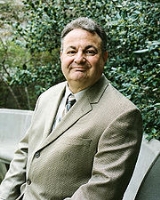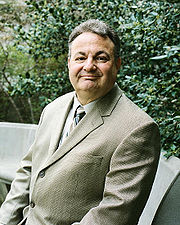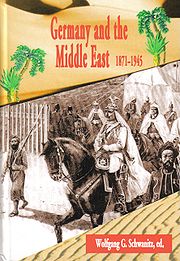
Wolfgang G. Schwanitz
Encyclopedia

Historian
A historian is a person who studies and writes about the past and is regarded as an authority on it. Historians are concerned with the continuous, methodical narrative and research of past events as relating to the human race; as well as the study of all history in time. If the individual is...
. He is a specialist in comparative studies of modern international relations
International relations
International relations is the study of relationships between countries, including the roles of states, inter-governmental organizations , international nongovernmental organizations , non-governmental organizations and multinational corporations...
between the United States
United States
The United States of America is a federal constitutional republic comprising fifty states and a federal district...
, the Middle East
Middle East
The Middle East is a region that encompasses Western Asia and Northern Africa. It is often used as a synonym for Near East, in opposition to Far East...
, and Europe
Europe
Europe is, by convention, one of the world's seven continents. Comprising the westernmost peninsula of Eurasia, Europe is generally 'divided' from Asia to its east by the watershed divides of the Ural and Caucasus Mountains, the Ural River, the Caspian and Black Seas, and the waterways connecting...
. Schwanitz is known for his research on relations between Arabs, Jews, and Germans, and on the history of German relations with the Middle East.
Background
Born in 1955, Schwanitz lived for seven years in CairoCairo
Cairo , is the capital of Egypt and the largest city in the Arab world and Africa, and the 16th largest metropolitan area in the world. Nicknamed "The City of a Thousand Minarets" for its preponderance of Islamic architecture, Cairo has long been a centre of the region's political and cultural life...
, Egypt
Egypt
Egypt , officially the Arab Republic of Egypt, Arabic: , is a country mainly in North Africa, with the Sinai Peninsula forming a land bridge in Southwest Asia. Egypt is thus a transcontinental country, and a major power in Africa, the Mediterranean Basin, the Middle East and the Muslim world...
, as his parents were diplomats. Back in East Germany, he attended the Max Planck
Max Planck
Max Karl Ernst Ludwig Planck, ForMemRS, was a German physicist who actualized the quantum physics, initiating a revolution in natural science and philosophy. He is regarded as the founder of the quantum theory, for which he received the Nobel Prize in Physics in 1918.-Life and career:Planck came...
high school of Berlin. In 1982 he finished five years of Middle Eastern studies
Middle Eastern studies
Middle Eastern studies is a name given to a number of academic programs associated with the study of the history, culture, politics, economies, and geography of the Middle East, an area that is generally interpreted to cover a range of nations extending from North Africa in the west to the Chinese...
as Arabist
Arabist
This is an article about the western scholars known as Arabists, not the political movement Pan-Arabism.An Arabist is someone normally from outside the Arab World who specialises in the study of the Arabic language and Arab culture, and often Arabic literature.-Origins:Arabists began in medieval...
/Economist
Economist
An economist is a professional in the social science discipline of economics. The individual may also study, develop, and apply theories and concepts from economics and write about economic policy...
at Leipzig University. In 1985 he completed his Ph.D. at Leipzig, on Egypt's open-door policy.
Career
In Berlin he headed the research group on Middle Eastern history at the Academy of SciencesAcademy of Sciences
An Academy of Sciences is a national academy or another learned society dedicated to sciences.In non-English speaking countries, the range of academic fields of the members of a national Academy of Science often includes fields which would not normally be classed as "science" in English...
. He has taught at Humboldt University, University of Potsdam
University of Potsdam
The University of Potsdam is a German university, situated across four campuses in Potsdam, Brandenburg, including the New Palace of Sanssouci and the Park Babelsberg.- Profile :...
, and Free University of Berlin
Free University of Berlin
Freie Universität Berlin is one of the leading and most prestigious research universities in Germany and continental Europe. It distinguishes itself through its modern and international character. It is the largest of the four universities in Berlin. Research at the university is focused on the...
. After German reunification
German reunification
German reunification was the process in 1990 in which the German Democratic Republic joined the Federal Republic of Germany , and when Berlin reunited into a single city, as provided by its then Grundgesetz constitution Article 23. The start of this process is commonly referred by Germans as die...
, he worked (1990–95) at the Modern Orient Center — founded by the Max Planck Society
Max Planck Society
The Max Planck Society for the Advancement of Science is a formally independent non-governmental and non-profit association of German research institutes publicly funded by the federal and the 16 state governments of Germany....
of Munich — and published books on relations between Germany and the Middle East. In the 1990s he was visiting fellow at CEDEJ
Centre d'études et de documentation économiques, juridiques et sociales
The CEDEJ is a French sponsored research center located in Cairo , created in 1968...
, Cairo (1992–93), at Princeton University
Princeton University
Princeton University is a private research university located in Princeton, New Jersey, United States. The school is one of the eight universities of the Ivy League, and is one of the nine Colonial Colleges founded before the American Revolution....
(1995–97), and at the German-American Center for Visiting Scholars of the German Historical Institute
German Historical Institute
German Historical Institute are five independent academic research institutes situated in Rome, London, Washington, D.C., Warsaw and Moscow, dedicated to the study of historical relations between Germany and the host countries in which they are based, along with four other institutions, in Paris,...
in Washington, D.C.
Washington, D.C.
Washington, D.C., formally the District of Columbia and commonly referred to as Washington, "the District", or simply D.C., is the capital of the United States. On July 16, 1790, the United States Congress approved the creation of a permanent national capital as permitted by the U.S. Constitution....
(1998). In Princeton, he finished two volumes on the history of Germans in the Middle East after World War II
World War II
World War II, or the Second World War , was a global conflict lasting from 1939 to 1945, involving most of the world's nations—including all of the great powers—eventually forming two opposing military alliances: the Allies and the Axis...
.
In his history of the German Orient Bank he showed by records from American and German archives how Jewish gold looted by Nazis in occupied Europe was sold in Turkey
Turkey
Turkey , known officially as the Republic of Turkey , is a Eurasian country located in Western Asia and in East Thrace in Southeastern Europe...
via the German Orient Bank. This bank was founded in 1906 by Dresdner Bank
Dresdner Bank
Dresdner Bank AG was one of Germany's largest banking corporations and was based in Frankfurt. It was acquired by competitor Commerzbank in December 2009.- 19th century :...
in Berlin, the second-largest German bank, and served 40 years in the Middle East.
In 2000, he settled near Princeton
Princeton, New Jersey
Princeton is a community located in Mercer County, New Jersey, United States. It is best known as the location of Princeton University, which has been sited in the community since 1756...
, USA. He researches and teaches Arabic, world history
World History
World History, Global History or Transnational history is a field of historical study that emerged as a distinct academic field in the 1980s. It examines history from a global perspective...
, and Middle Eastern history at local colleges, among them Burlington County College
Burlington County College
Burlington County College is an accredited, co-educational, two-year, public, community college located in Burlington County, New Jersey...
in Pemberton, New Jersey
Pemberton, New Jersey
Pemberton, formerly New Mills, is a Borough in Burlington County, New Jersey, United States. As of the United States 2000 Census, the borough population was 1,210....
, and Rider University
Rider University
Rider University is a private, coeducational and nonsectarian university located chiefly in Lawrenceville, in Mercer County, New Jersey, United States...
in Lawrenceville, New Jersey
Lawrenceville, New Jersey
Lawrenceville is a census-designated place and unincorporated area located within Lawrence Township in Mercer County, New Jersey. As of the 2010 United States Census, the CDP population was 3,887...
and Princeton, New Jersey (2004–08). He edits a book series of comparative studies on America-Mideast-Europe and he is visiting professor at the Gloria Center, Herzliya, Israel.
His works on the German and American Islam
Islam
Islam . The most common are and . : Arabic pronunciation varies regionally. The first vowel ranges from ~~. The second vowel ranges from ~~~...
policy met a wide response. Schwanitz authored four and edited ten books. He authored 70 book chapters on history and politics of the Middle East in international relations
International relations
International relations is the study of relationships between countries, including the roles of states, inter-governmental organizations , international nongovernmental organizations , non-governmental organizations and multinational corporations...
since 1798, as modernity
Modernity
Modernity typically refers to a post-traditional, post-medieval historical period, one marked by the move from feudalism toward capitalism, industrialization, secularization, rationalization, the nation-state and its constituent institutions and forms of surveillance...
came to the Middle East.
Books

- Egypt's Infitah Open-Door Policy, Department of Afro-Asian Studies: Leipzig 1985
- Berlin-Cairo: Then and Today, German-Egyptian Society: Berlin 1991, ed.
- The G.D.R. and the Third World, 1949–90, Lit: Muenster 1993-95, 3 vols., co-ed.
- Beyond of the Legends: Arabs, Jews, Germans, Dietz: Berlin 1994, ed.
- Germans in the Mideast 1946-65, Princeton 1995, 2 vols.
- Germans in the Mideast 1946-65, Haensel-Hohenhausen : Frankfurt 1998, 2 vols.
- Egypt and Germany in the 19th-20th Century, Dar ath-Thaqafa: Cairo 1998, with Wagih Atiq
- 125 Years of Suez Canal, Olms: Hildesheim 1998, ed.
- August Bebel: The Muhammadan-Arab Periode of Culture, Edition East: Berlin 1999, ed.
- Gold, Bankers, and Diplomats: A History of the German Orient Bank, Trafo Berlin 2002
- Germany and the Middle East, University Publishers: Leipzig 2004, ed.
- Germany and the Middle East, 1871–1945, Wiener: Princeton Papers 2004, ed.
- Germany and the Middle East, 1871–1945, Wiener 2004, (and Iberoamericana: Madrid 2004)
- Germany and the Middle East in the Cold War, University Publishers: Leipzig 2006, ed.
Audios and Videos with W.G. Schwanitz
- Grand Mufti Amin Al Husseini of Jerusalem
- Hitler, The Grand Mufti and Islamism
- America's Unwritten Islam Policy
Contributions
- "Sarah Palin", Webversion 4-2011
- "Late Ottoman Empire", Webversion 2-2011
- "Global Mufti al-Qaradawi", Webversion 12-2010
- "German Oriental Studies", Webversion 11-2010
- "Nazis, Jews and Soviets", Webversion 10-2010
- "Arab Responses to the Holocaust", Webversion 6-2010
- "Germans, Nukes and Mullahs", Webversion 5-2010
- "America and the Third Reich", Webversion 5-2010
- "Nazis On The Run", Webversion 5-2010
- "Hitler in the Levant", Webversion 12-2009
- "Stalin in Mecca", Webversion 8-2009
- "Le bâton RDA", Webversion 5-2009
- "Looking Into Hamas," Webversion 4-2009
- "The Schaikh and The Shoah", Webversion 4-2009
- "German-Kuwaiti Relations", Webversion 3-2009
- "Euro-Islam", Webversion 3-2009
- "The Mind of Jihad", Webversion 1-2009
- "Zionism: A Brief History", Webversion 10-2008
- "Occidentalistics by Hasan Hanafi", Webversion 10-2008
- "Shaikh Salih and Euro Islam", Webversion 10-2008
- "Germany and Palestine", Webversion 10-2008
- "The Bellicose Birth of Euro Islam", Webversion 1-2008
- "Germany's Middle East Policy", Webversion 9-2007
- "America's Unwritten Islam Policy", Webversion 9-2006, 10-2006
- "Fritz Grobba and the German Middle East Policy", Webversion 9-2004
Literature on W.G. Schwanitz
- Emma Murphy, Gerd NonnemanGerd NonnemanGerd Nonneman is professor of Arab Gulf studies and a former Director of the Institute of Arab and Islamic Studies at the University of Exeter. As of September 2011, he will be the Dean of the School of Foreign Service at Georgetown University's campus in Qatar...
, Neil Quilliam: Middle East & North Africa: A Directory of Specialists and Institutions, Eurames: Durham 1993 - Kai Hafez: Oriental Studies in the G.D.R., 1969–89, Orient Institute: Hamburg 1995
- Wolf-Hagen Krauth, Ralf Wolz (eds.): Humanities and Re-Unification, Academy: Berlin 1998
- Ekkehard Rudolph: State of Art: Cultural Studies and Humanities on the Muslim World, Orient Institute: Hamburg 1999
- Stefan Bollinger, Ulrich van der Heyden (eds.): German Unity and Elite Change in East Germany, Trafo: Berlin 2002
- Clemens Heni: Schadenfreude. Islamforschung und Antisemitismus in Deutschland nach 9/11, Edition Critic: Berlin 2011
External links
- W.G. Schwanitz in World Catalogue
- Clio Online Web Directory Scholars
- German National Library
- Library of Congress
- duckduckgo
- Wolfgang G. Schwanitz homepage

